Ethical Challenges in Nursing Management: A Case Study Examination
VerifiedAdded on 2022/09/09
|5
|1111
|17
Essay
AI Summary
This essay delves into the critical role of ethics in nursing management, emphasizing its impact on daily decision-making and patient care. Using a case study of Xiamei Hu, a family nurse, the essay explores ethical dilemmas arising from changes in leadership and conflicting values. The analysis highlights key ethical principles such as advocacy, beneficence, and the duty of care, as well as the importance of integrity, honesty, and justice in nursing practice. The essay examines how nurse managers face moral distress and the need for ethical leadership. It discusses the consequences of unethical behavior by leaders, such as the new director's actions, and the importance of addressing such issues through reporting and seeking support. Ultimately, the essay underscores the need for nurse leaders to support staff, act professionally, and uphold ethical standards to ensure quality patient services and a positive work environment.
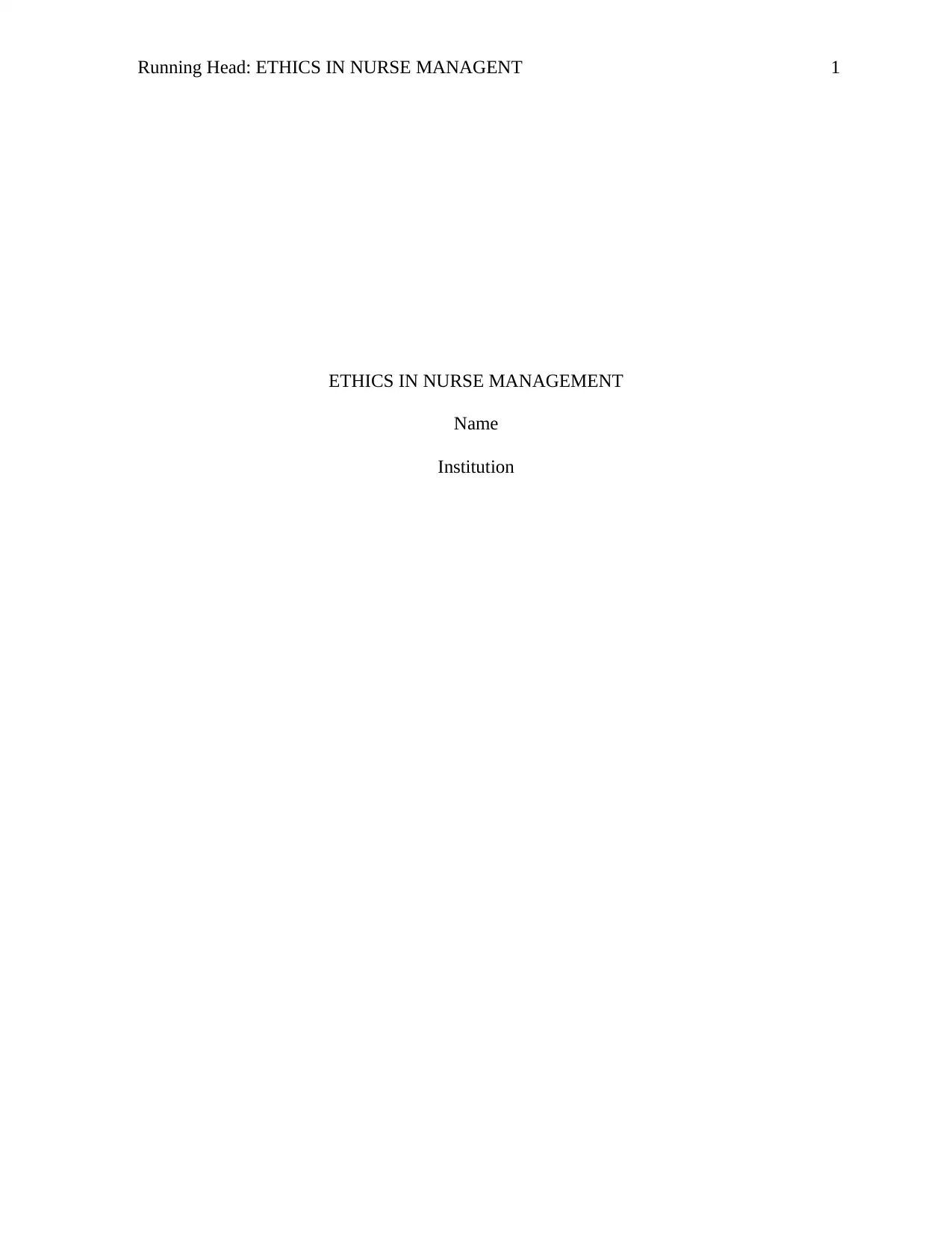
Running Head: ETHICS IN NURSE MANAGENT 1
ETHICS IN NURSE MANAGEMENT
Name
Institution
ETHICS IN NURSE MANAGEMENT
Name
Institution
Paraphrase This Document
Need a fresh take? Get an instant paraphrase of this document with our AI Paraphraser
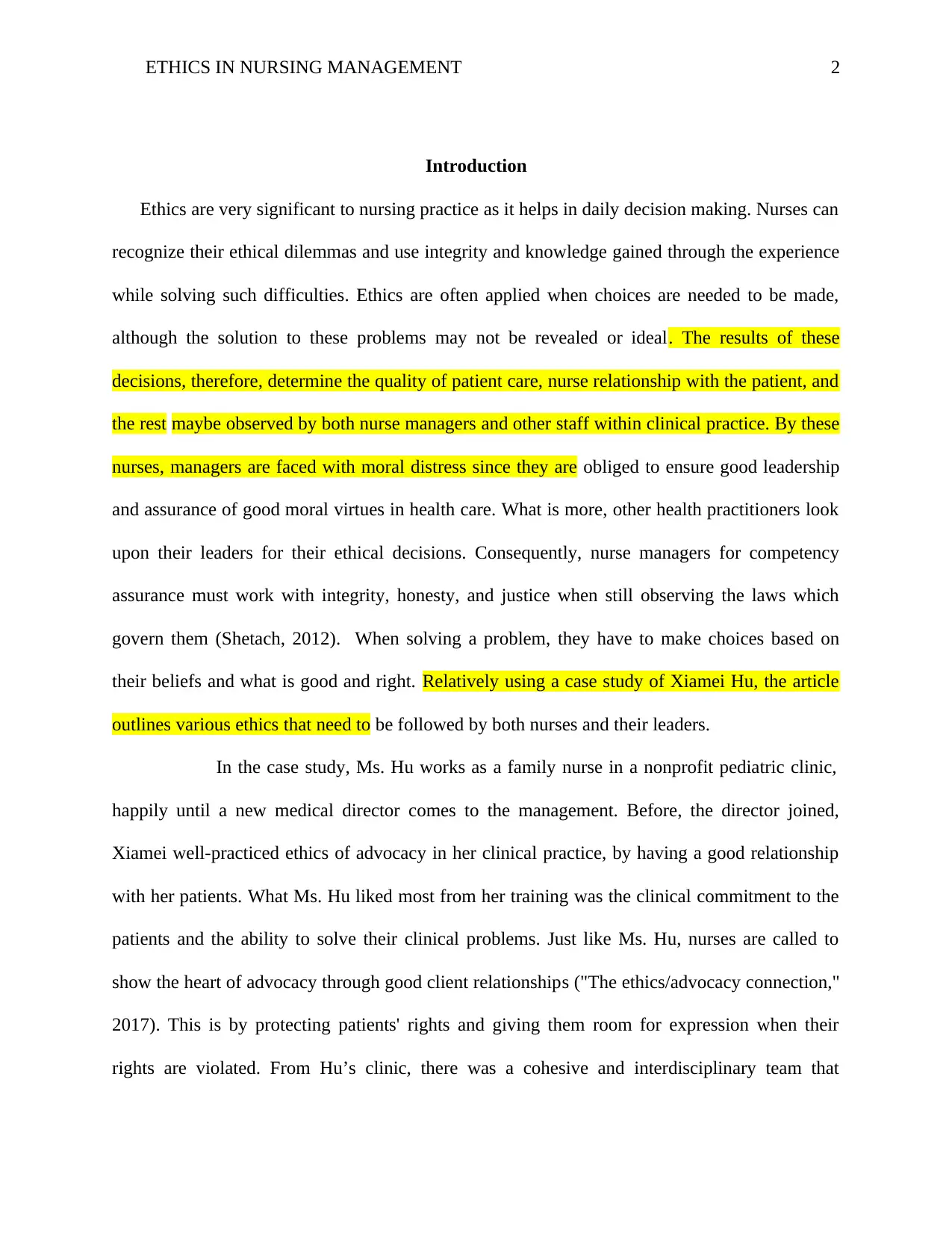
ETHICS IN NURSING MANAGEMENT 2
Introduction
Ethics are very significant to nursing practice as it helps in daily decision making. Nurses can
recognize their ethical dilemmas and use integrity and knowledge gained through the experience
while solving such difficulties. Ethics are often applied when choices are needed to be made,
although the solution to these problems may not be revealed or ideal. The results of these
decisions, therefore, determine the quality of patient care, nurse relationship with the patient, and
the rest maybe observed by both nurse managers and other staff within clinical practice. By these
nurses, managers are faced with moral distress since they are obliged to ensure good leadership
and assurance of good moral virtues in health care. What is more, other health practitioners look
upon their leaders for their ethical decisions. Consequently, nurse managers for competency
assurance must work with integrity, honesty, and justice when still observing the laws which
govern them (Shetach, 2012). When solving a problem, they have to make choices based on
their beliefs and what is good and right. Relatively using a case study of Xiamei Hu, the article
outlines various ethics that need to be followed by both nurses and their leaders.
In the case study, Ms. Hu works as a family nurse in a nonprofit pediatric clinic,
happily until a new medical director comes to the management. Before, the director joined,
Xiamei well-practiced ethics of advocacy in her clinical practice, by having a good relationship
with her patients. What Ms. Hu liked most from her training was the clinical commitment to the
patients and the ability to solve their clinical problems. Just like Ms. Hu, nurses are called to
show the heart of advocacy through good client relationships ("The ethics/advocacy connection,"
2017). This is by protecting patients' rights and giving them room for expression when their
rights are violated. From Hu’s clinic, there was a cohesive and interdisciplinary team that
Introduction
Ethics are very significant to nursing practice as it helps in daily decision making. Nurses can
recognize their ethical dilemmas and use integrity and knowledge gained through the experience
while solving such difficulties. Ethics are often applied when choices are needed to be made,
although the solution to these problems may not be revealed or ideal. The results of these
decisions, therefore, determine the quality of patient care, nurse relationship with the patient, and
the rest maybe observed by both nurse managers and other staff within clinical practice. By these
nurses, managers are faced with moral distress since they are obliged to ensure good leadership
and assurance of good moral virtues in health care. What is more, other health practitioners look
upon their leaders for their ethical decisions. Consequently, nurse managers for competency
assurance must work with integrity, honesty, and justice when still observing the laws which
govern them (Shetach, 2012). When solving a problem, they have to make choices based on
their beliefs and what is good and right. Relatively using a case study of Xiamei Hu, the article
outlines various ethics that need to be followed by both nurses and their leaders.
In the case study, Ms. Hu works as a family nurse in a nonprofit pediatric clinic,
happily until a new medical director comes to the management. Before, the director joined,
Xiamei well-practiced ethics of advocacy in her clinical practice, by having a good relationship
with her patients. What Ms. Hu liked most from her training was the clinical commitment to the
patients and the ability to solve their clinical problems. Just like Ms. Hu, nurses are called to
show the heart of advocacy through good client relationships ("The ethics/advocacy connection,"
2017). This is by protecting patients' rights and giving them room for expression when their
rights are violated. From Hu’s clinic, there was a cohesive and interdisciplinary team that
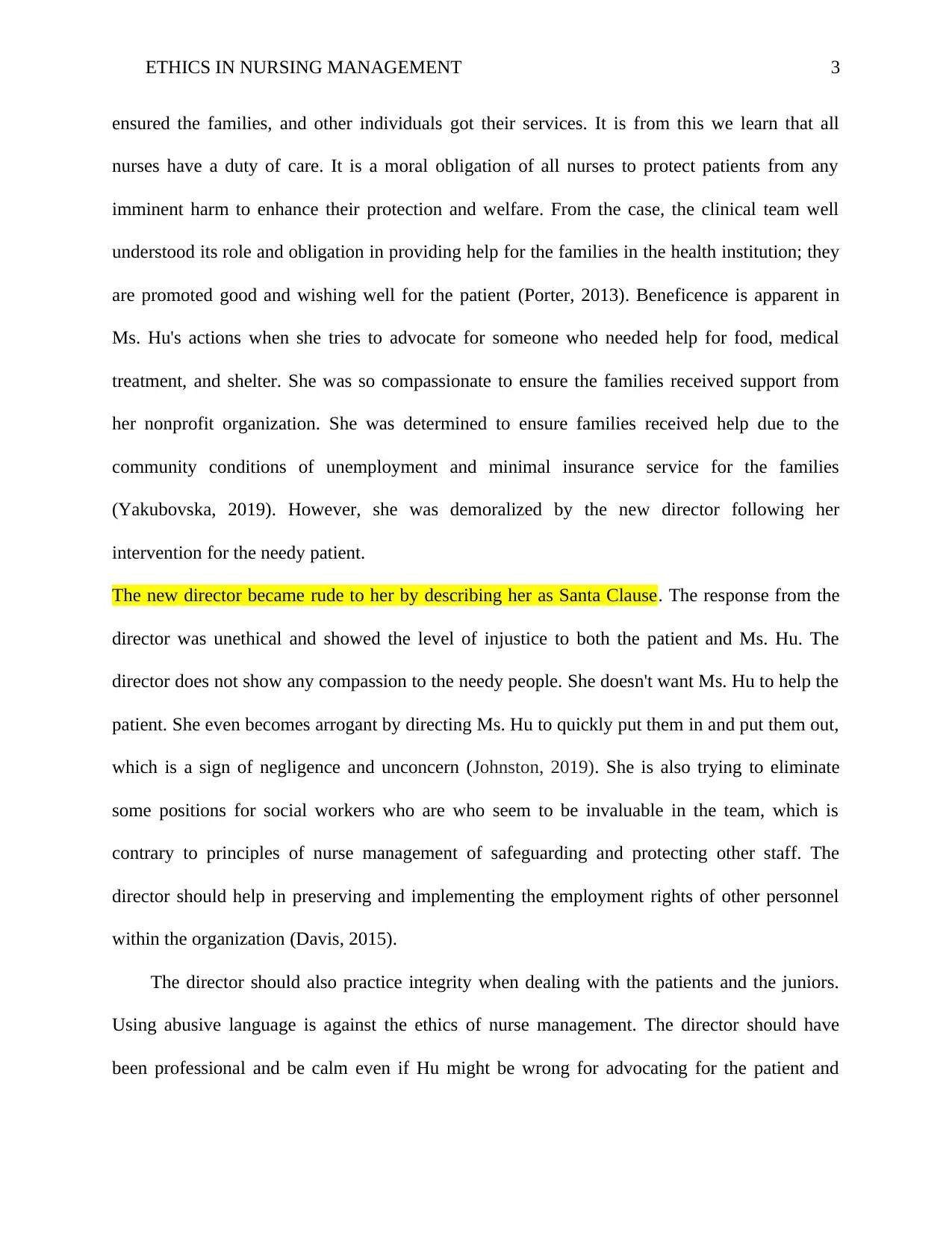
ETHICS IN NURSING MANAGEMENT 3
ensured the families, and other individuals got their services. It is from this we learn that all
nurses have a duty of care. It is a moral obligation of all nurses to protect patients from any
imminent harm to enhance their protection and welfare. From the case, the clinical team well
understood its role and obligation in providing help for the families in the health institution; they
are promoted good and wishing well for the patient (Porter, 2013). Beneficence is apparent in
Ms. Hu's actions when she tries to advocate for someone who needed help for food, medical
treatment, and shelter. She was so compassionate to ensure the families received support from
her nonprofit organization. She was determined to ensure families received help due to the
community conditions of unemployment and minimal insurance service for the families
(Yakubovska, 2019). However, she was demoralized by the new director following her
intervention for the needy patient.
The new director became rude to her by describing her as Santa Clause. The response from the
director was unethical and showed the level of injustice to both the patient and Ms. Hu. The
director does not show any compassion to the needy people. She doesn't want Ms. Hu to help the
patient. She even becomes arrogant by directing Ms. Hu to quickly put them in and put them out,
which is a sign of negligence and unconcern (Johnston, 2019). She is also trying to eliminate
some positions for social workers who are who seem to be invaluable in the team, which is
contrary to principles of nurse management of safeguarding and protecting other staff. The
director should help in preserving and implementing the employment rights of other personnel
within the organization (Davis, 2015).
The director should also practice integrity when dealing with the patients and the juniors.
Using abusive language is against the ethics of nurse management. The director should have
been professional and be calm even if Hu might be wrong for advocating for the patient and
ensured the families, and other individuals got their services. It is from this we learn that all
nurses have a duty of care. It is a moral obligation of all nurses to protect patients from any
imminent harm to enhance their protection and welfare. From the case, the clinical team well
understood its role and obligation in providing help for the families in the health institution; they
are promoted good and wishing well for the patient (Porter, 2013). Beneficence is apparent in
Ms. Hu's actions when she tries to advocate for someone who needed help for food, medical
treatment, and shelter. She was so compassionate to ensure the families received support from
her nonprofit organization. She was determined to ensure families received help due to the
community conditions of unemployment and minimal insurance service for the families
(Yakubovska, 2019). However, she was demoralized by the new director following her
intervention for the needy patient.
The new director became rude to her by describing her as Santa Clause. The response from the
director was unethical and showed the level of injustice to both the patient and Ms. Hu. The
director does not show any compassion to the needy people. She doesn't want Ms. Hu to help the
patient. She even becomes arrogant by directing Ms. Hu to quickly put them in and put them out,
which is a sign of negligence and unconcern (Johnston, 2019). She is also trying to eliminate
some positions for social workers who are who seem to be invaluable in the team, which is
contrary to principles of nurse management of safeguarding and protecting other staff. The
director should help in preserving and implementing the employment rights of other personnel
within the organization (Davis, 2015).
The director should also practice integrity when dealing with the patients and the juniors.
Using abusive language is against the ethics of nurse management. The director should have
been professional and be calm even if Hu might be wrong for advocating for the patient and
⊘ This is a preview!⊘
Do you want full access?
Subscribe today to unlock all pages.

Trusted by 1+ million students worldwide
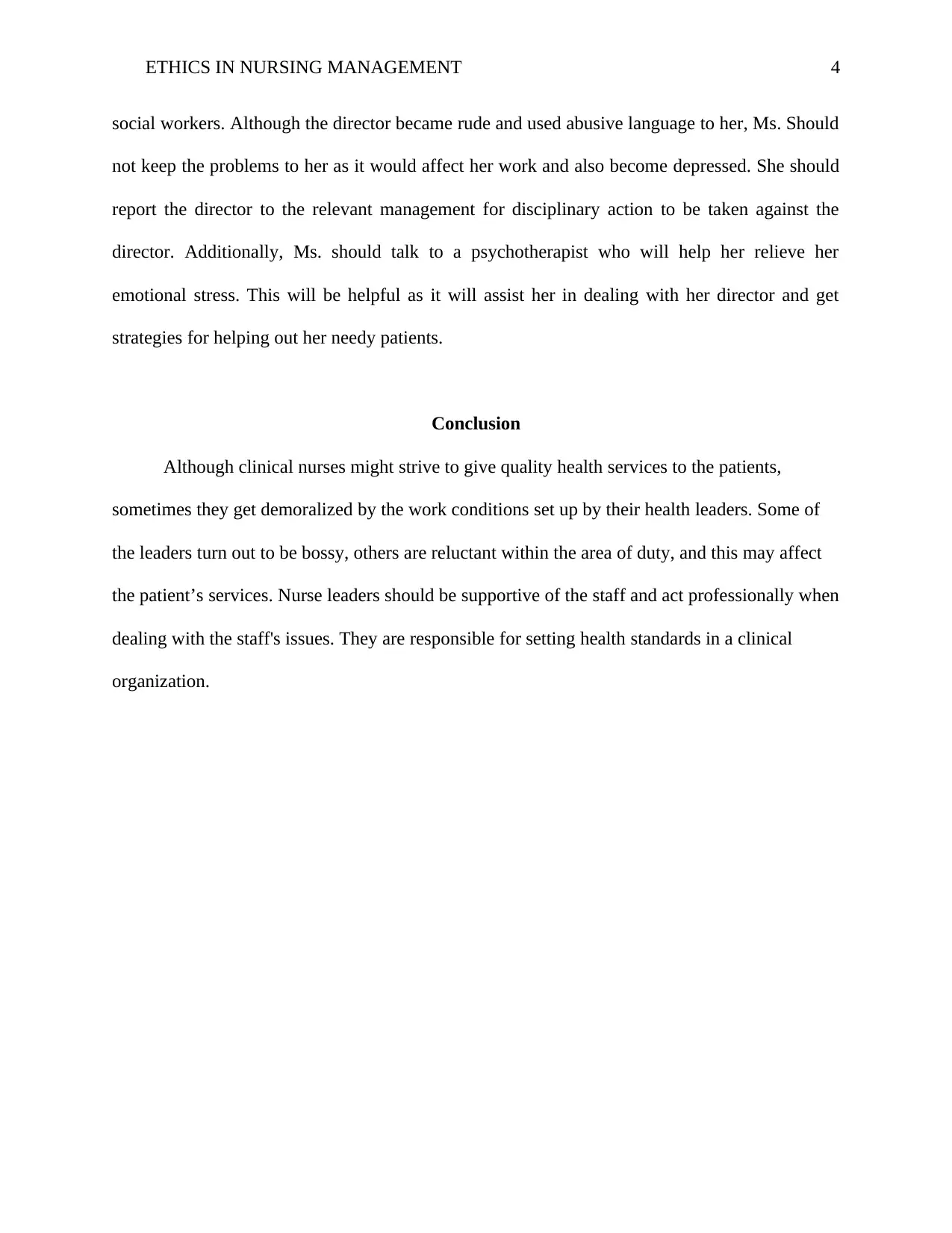
ETHICS IN NURSING MANAGEMENT 4
social workers. Although the director became rude and used abusive language to her, Ms. Should
not keep the problems to her as it would affect her work and also become depressed. She should
report the director to the relevant management for disciplinary action to be taken against the
director. Additionally, Ms. should talk to a psychotherapist who will help her relieve her
emotional stress. This will be helpful as it will assist her in dealing with her director and get
strategies for helping out her needy patients.
Conclusion
Although clinical nurses might strive to give quality health services to the patients,
sometimes they get demoralized by the work conditions set up by their health leaders. Some of
the leaders turn out to be bossy, others are reluctant within the area of duty, and this may affect
the patient’s services. Nurse leaders should be supportive of the staff and act professionally when
dealing with the staff's issues. They are responsible for setting health standards in a clinical
organization.
social workers. Although the director became rude and used abusive language to her, Ms. Should
not keep the problems to her as it would affect her work and also become depressed. She should
report the director to the relevant management for disciplinary action to be taken against the
director. Additionally, Ms. should talk to a psychotherapist who will help her relieve her
emotional stress. This will be helpful as it will assist her in dealing with her director and get
strategies for helping out her needy patients.
Conclusion
Although clinical nurses might strive to give quality health services to the patients,
sometimes they get demoralized by the work conditions set up by their health leaders. Some of
the leaders turn out to be bossy, others are reluctant within the area of duty, and this may affect
the patient’s services. Nurse leaders should be supportive of the staff and act professionally when
dealing with the staff's issues. They are responsible for setting health standards in a clinical
organization.
Paraphrase This Document
Need a fresh take? Get an instant paraphrase of this document with our AI Paraphraser
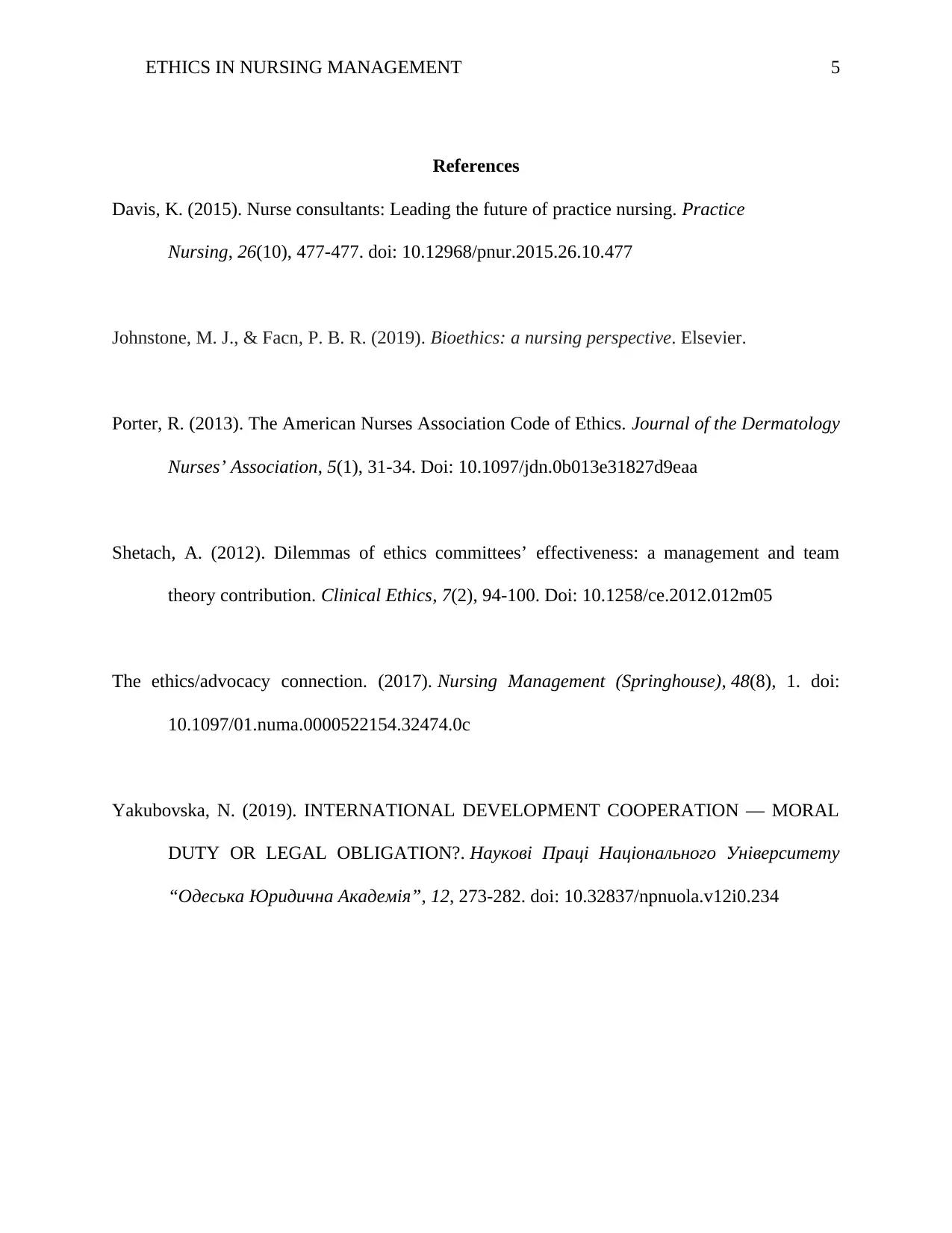
ETHICS IN NURSING MANAGEMENT 5
References
Davis, K. (2015). Nurse consultants: Leading the future of practice nursing. Practice
Nursing, 26(10), 477-477. doi: 10.12968/pnur.2015.26.10.477
Johnstone, M. J., & Facn, P. B. R. (2019). Bioethics: a nursing perspective. Elsevier.
Porter, R. (2013). The American Nurses Association Code of Ethics. Journal of the Dermatology
Nurses’ Association, 5(1), 31-34. Doi: 10.1097/jdn.0b013e31827d9eaa
Shetach, A. (2012). Dilemmas of ethics committees’ effectiveness: a management and team
theory contribution. Clinical Ethics, 7(2), 94-100. Doi: 10.1258/ce.2012.012m05
The ethics/advocacy connection. (2017). Nursing Management (Springhouse), 48(8), 1. doi:
10.1097/01.numa.0000522154.32474.0c
Yakubovska, N. (2019). INTERNATIONAL DEVELOPMENT COOPERATION — MORAL
DUTY OR LEGAL OBLIGATION?. Наукові Праці Національного Університету
“Одеська Юридична Академія”, 12, 273-282. doi: 10.32837/npnuola.v12i0.234
References
Davis, K. (2015). Nurse consultants: Leading the future of practice nursing. Practice
Nursing, 26(10), 477-477. doi: 10.12968/pnur.2015.26.10.477
Johnstone, M. J., & Facn, P. B. R. (2019). Bioethics: a nursing perspective. Elsevier.
Porter, R. (2013). The American Nurses Association Code of Ethics. Journal of the Dermatology
Nurses’ Association, 5(1), 31-34. Doi: 10.1097/jdn.0b013e31827d9eaa
Shetach, A. (2012). Dilemmas of ethics committees’ effectiveness: a management and team
theory contribution. Clinical Ethics, 7(2), 94-100. Doi: 10.1258/ce.2012.012m05
The ethics/advocacy connection. (2017). Nursing Management (Springhouse), 48(8), 1. doi:
10.1097/01.numa.0000522154.32474.0c
Yakubovska, N. (2019). INTERNATIONAL DEVELOPMENT COOPERATION — MORAL
DUTY OR LEGAL OBLIGATION?. Наукові Праці Національного Університету
“Одеська Юридична Академія”, 12, 273-282. doi: 10.32837/npnuola.v12i0.234
1 out of 5
Related Documents
Your All-in-One AI-Powered Toolkit for Academic Success.
+13062052269
info@desklib.com
Available 24*7 on WhatsApp / Email
![[object Object]](/_next/static/media/star-bottom.7253800d.svg)
Unlock your academic potential
Copyright © 2020–2026 A2Z Services. All Rights Reserved. Developed and managed by ZUCOL.





